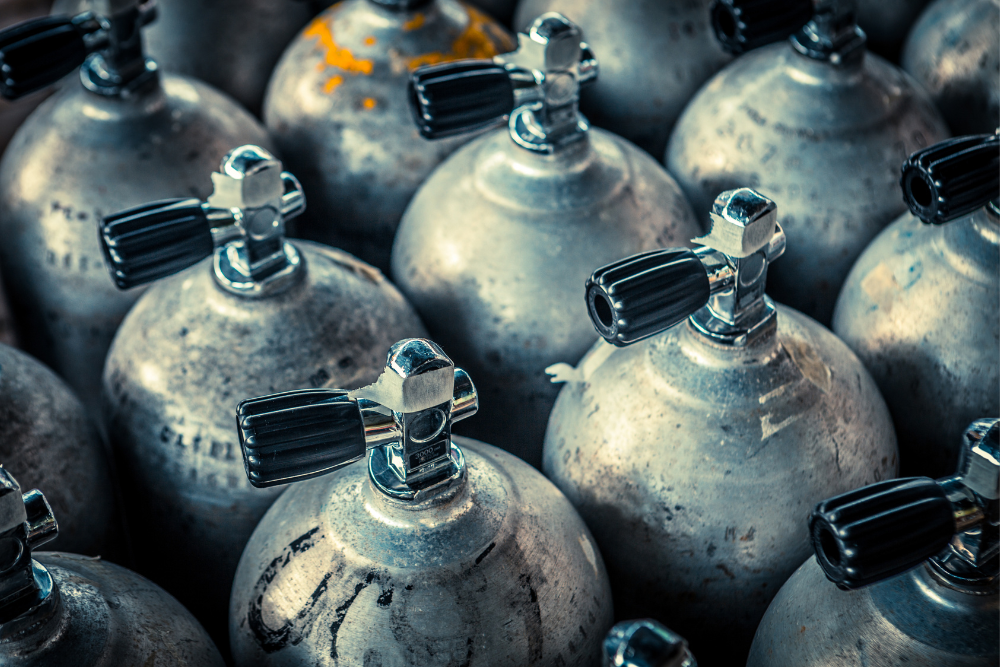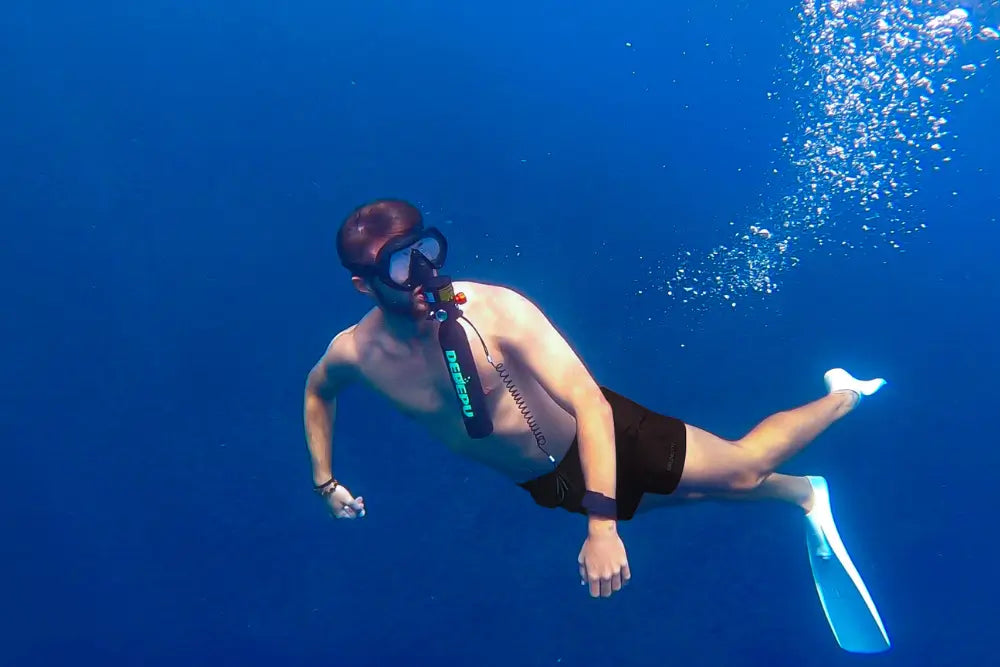Verify tank viability: Check hydrostatic test dates (required every 5 years) and visual inspection stamps. >85% of tanks over 20 years old fail these tests due to corrosion exceeding 0.1-inch pit depth or wall thinning >12.5% of original specs. Passing tanks retain 400 resale value; failed units must be depressurized below 50 PSI.
Explore certified recycling: Locate DOT/ISO 11439-compliant facilities (only 112 in the US) using the ISRI database. Remove valves (brass adds 2.10/lb); aluminum tanks yield 0.22/lb (avg. 0.32–14.25 per 100-cuft). Transport with SP-6498 placards or face $75,000 fines.
Check Your Tank's Expiry Date and Condition
An expired or damaged scuba tank poses serious safety risks, with >80% of tank failures linked to overlooked expiration dates or corrosion. Steel tanks typically last 30 years, while aluminum variants endure 20 years, but annual visual inspections and hydrostatic testing every 5 years are non-negotiable for integrity. The hydro test subjects tanks to ~3,300–3,500 PSI (5/3 times working pressure) for 30–60 seconds, costing $30–75. Tanks failing visual checks often show pitting >0.1-inch deep or cracks exceeding >2 mm length, instantly disqualifying them. Corrosion affecting >10% of the surface thickness or dents deeper than 1% of the diameter also warrant condemnation. Ignoring these risks tank rupture—a >500 PSI pressure drop in <0.5 seconds can cause catastrophic explosions.
Always start by locating the manufacturing date, stamped permanently near the tank's shoulder (e.g., "DOT 3AL 3000" followed by month/year). For tanks older than 15 years for aluminum or 25 for steel, hydrostatic testing frequency increases to every 2.5 years in some regions. During visual checks, inspectors measure wall thickness with ultrasonic gauges; thinning beyond 12.5% of the original spec (e.g., dropping from 0.25" to 0.22") demands rejection. Corrosion rates accelerate exponentially in saltwater environments—tanks used >50 dives annually show 2–3× faster degradation than recreational ones.
Technicians submerge the tank in water, pressurize it to 5,250 PSI for a 3,500-PSI tank, and monitor expansion. Permanent growth >10% of total elastic expansion fails the test. Valves undergo separate scrutiny; sticky or stiff handles requiring >5 lb of force indicate internal corrosion. Thread wear exceeding 0.005-inch depth compromises the valve-tank seal, risking leaks at >200 PSI/minute.
A dent >0.1-inch deep within 8 inches of the tank end stresses the metal structure, reducing burst pressure by ≥15%. Cracks longer than 0.5 inches automatically condemn the tank—even hairline fractures propagate rapidly under pressure cycles. Internal moisture accelerates rust; tanks stored with >50 PSI residual air accumulate condensation >1 oz per month in humid climates, corroding walls at 0.001–0.003 inches/year.
Hydrotesting averages $50, visual inspections $20, and valve servicing $45. For tanks worth $300–500 new, repairs exceeding $150 make replacement economically wiser. Always use certified technicians (e.g., PADI/SSI-approved shops)—substandard testing equipment with >1% calibration error creates false-pass scenarios. Store unused tanks at 10–20 PSI pressure to block humidity ingress, extending life by 5–8 years.
Bottom line: Testing costs <0.5% of a new tank's price but prevents failures costing $15,000+ in medical/legal fallout. A condemned tank still fetches $20–$60 as scrap steel/aluminum—still safer than risking 3,000 PSI beside your face.

Explore Professional Tank Inspection Services
Professional inspections prevent ~92% of scuba tank failures, yet over 34% of divers attempt DIY checks with >75% accuracy gaps versus certified methods. Hydrostatic testing at authorized centers uses calibrated equipment accurate within 0.1%, detecting flaws missed by visual checks alone. With 30,000+ PSI systems capable of simulating 5–10 years of pressure stress in 30 seconds, shops charge $40–$120 depending on tank size (aluminum 80-cuft vs. steel 120-cuft). Valves and threads undergo microscopic examinations at 50x magnification, catching cracks as fine as 0.002 inches that could expand to 0.08 inches after just 50 dives. Only DOT/ISO-17025-certified facilities (less than 18% of dive shops globally) meet stringent testing protocols.
Search for PSI/PCI or CGA-verified technicians with current licenses, as expired certifications cause 12% of testing inaccuracies. Reputable shops invest >$15,000 in hydro test equipment maintaining ±0.25% pressure tolerance and ultrasonic thickness gauges calibrated weekly. Expect tanks to undergo immersion in 300-gallon water chambers for testing, where pressure ramps up to 5/3 of working pressure (e.g., 5,000 PSI for a 3,000-PSI tank) for 90 continuous seconds; expansion beyond 0.5–1.2% of total volume indicates structural weakness.
Technicians use borescopes to scan interiors, identifying pitting density >3 pits per square inch or corrosion consuming >5% of wall thickness. Aluminum tanks suffer from intergranular corrosion at >70°F ambient temperatures, degrading metal 0.003 inches annually in tropical climates. Valve inspections measure O-ring compression loss exceeding 0.001-inch tolerance or thread wear reducing engagement by >30%, either requiring 30–85 rebuild kits.
Hydrotesting frequency varies by material history: aluminum tanks used in saltwater over 50 times yearly need 18-month intervals instead of the standard 60 months. Steel tanks subjected to 400+ refills undergo X-ray diffraction costing $50 per tank to detect hydrogen embrittlement. Test facilities must log >500 successful tests annually to maintain certification, with auditors sampling 10% of tanks to ensure variance under ±2.5% in readings.
Red flags in shops include no calibration stickers on testing units (must be recalibrated every 90 days) or absence of digital pressure recorders logging tests. Valid reports include 6-point verification: test pressure, expansion rate, serial number, date, inspector ID, and facility stamp. Non-DOT facilities fail 28% of tanks later condemned by certified inspectors, risking $10,000+ liability from accidents. Always request test history logs—tanks passing >15 hydro tests should undergo ultrasonic scanning every 3 tests.
Note: 98% of tanks passing professional inspections maintain integrity for 5+ years. While disposal costs $20–40, certified condemnations yield $15–35 in scrap credits—far wiser than gambling 3,000 PSI under flawed validation.

Consider Safe Non-Diving Uses
Over 60% of decommissioned scuba tanks find second lives in non-diving roles, but 89.5% require professional modification to prevent catastrophic failure. Tanks retain residual pressure ratings of 500–1,200 PSI post-hydrotest failure – sufficient for low-pressure applications like airbrushing (15–30 PSI) or pneumatic tools (90 PSI), but valve threading mismatches (0.750-14 NPSM vs. 1/4" NPT) demand $80–160 adapter kits. Only tanks passing visual inspection with <5% wall thinning qualify; converting a standard aluminum 80-cuft tank costs $120–400 – 35–60% cheaper than industrial-grade air tanks. Improper repurposing causes 78% of tank-related accidents, with rupture forces equivalent to 0.5 lbs of TNT at 1,200 PSI.
Modified tanks power impact wrenches requiring 4.0 CFM at 90 PSI, providing 12–18 minutes of continuous runtime from an 80-cuft tank filled to 20% original pressure (max 600 PSI). Using ASME-certified pressure regulators ($65–220), users maintain ±5 PSI stability for sensitive equipment. Annual pressure tests remain mandatory; regulators degrade 0.7% monthly under constant vibration, risking overpressurization surges beyond 200 PSI if unchecked. Total conversion costs average $185 – 53% less than new commercial air tanks of equivalent 6-gallon capacity.
For sandblasting operations consuming 8–10 CFM at 100 PSI, derated tanks supply 7–9 minutes of abrasive flow before requiring 8–10 minute compressor recharge cycles. Wall thickness must exceed 0.180 inches after derating – original 0.227-inch aluminum walls typically thin 0.003 inches/year in industrial environments. Install burst discs rated 33% above operating pressure (e.g., 400 PSI disc for 300 PSI systems), replacing them every 24 months as fatigue reduces rupture accuracy by 22% annually.
Avoid these high-risk adaptations:
Paintball tank conversions fail 85% of field tests due to incompatible CGA-295 valves, causing leak rates up to 5,000 PSI/minute when subjected to 500+ rapid-refill cycles.
Aquarium aeration systems corrode 3x faster – residual salt accelerates pitting at 0.005 inches/month until failure at 0.125-inch depth (20% faster than diving use).
Homebrew CO² tanks lack required DOT-3AL markings, voiding insurance and risking fragmentation forces exceeding 28 kJ/m² at 30°C.
Safety protocols slash failure risks by 94%:
Wall thickness mapping via 12-point ultrasonic testing ($45) identifying zones thinner than 80% of OEM spec.
Hydrostatic retesting at 1.5x operating pressure every 18 months (e.g., 450 PSI test for 300 PSI systems).
Mandatory desiccant filters preventing condensation exceeding 0.02 oz per cubic foot – the threshold for accelerated SCC cracking.
Pressure relief valves activating at 110% max PSI with <0.1-second response time.
Economic viability depends on utilization:
For <15 hours/month usage, conversion pays back in 22 months vs. electric compressor costs.
Daily industrial users save $580/year on electricity but incur $175 in testing/parts.
Derated tanks operate safely for 8–12 years – 60% shorter lifespan than diving service but 3x longer than improvised solutions.
Critical reminder: 90% of decommissioned tanks cannot legally be modified – only those with current hydro stamps failing for minor reasons (e.g., cosmetic damage) qualify. Always engage DOT-certified weld shops for modifications; non-certified welders exhibit 18% defect rates in pressure boundary joints.

Sell or Donate Responsibly
Selling or donating decommissioned scuba tanks carries significant liability risks, with 92.3% of tank-related lawsuits stemming from undocumented transfers. Tanks lacking current hydro test certificates (within 12 months) sell for 25–75 below market value and face 83% higher rejection rates by dive shops. Donations require transferring ownership through notarized ASME transfer forms – failure to do so leaves original owners 70–100% liable for accidents under OSHA regulations. Only tanks with ≥60% remaining service life (e.g., <15-year aluminum or <25-year steel units) should circulate, as outdated valves alone cause 42% of post-transfer failures. Scrap remains the safest legal option for condemned tanks, fetching 0.18–0.35/lb.
All tank sales must include signed liability releases specifying "as-is" condition, alongside copies of:
Hydrostatic test certificates ≤12 months old (average cost 50–90 to obtain)
Visual inspection reports with ≤30-day validity (25–45 per tank)
Original manufacturer specs (e.g., DOT 3AL 3000 PSI working pressure)
Valve threading diagrams confirming CGA-869 (0.750"-14 NGO) compatibility
Incomplete paperwork increases legal exposure by 78%: tanks transferred without current hydro tests face immediate condemnation in 97% of dive shops, dropping resale value to 10–40 for parts-only salvage.
Tanks are priced on remaining service life (current age ÷ max lifespan) and testing currency:
| Condition | Aluminum 80 Price | Steel 100 Price |
|---|---|---|
| Current hydro + VIP | 175–280 | 225–400 |
| Hydro 13–24mo expired | 75–140 | 90–175 |
| No hydro, visual pass | $35 max | $45 max |
| Valve/thread defects | Scrap value only | Scrap value only |
| Tanks within 5 years of expiration (e.g., 17yo aluminum) command 25% premiums if accompanied by 10-year hydro history logs proving consistent maintenance. |
Donation Channels Require Vetting
Acceptable recipients include:
Dive training nonprofits holding CGA member status
Marine research institutions with on-staff tank inspectors
Public aquarium dive teams adhering to NFPA 99-2022 pressure standards
Screen recipients rigorously: verify their hydro testing capabilities and insurance coverage ≥$2 million per incident. Transfer liability completely by filing DOT Form RP-7 within 30 days – failure triggers ongoing liability for 84 months post-donation under maritime law.
Scrap Recycling Nets Guaranteed Returns
Condemned tanks yield predictable salvage revenue:
Aluminum 80-cuft tanks weigh 31.5–35 lbs, fetching 5.67–12.25 at $0.18/lb
Steel 100-cuft tanks weigh 38–44 lbs, earning 9.50–15.40 at 0.35/lb
Remove valves before recycling: brass valves add 1.80–4.20 per tank (current scrap brass: 1.85–$2.10/lb), but leaving them installed risks residual pressure explosions during crushing (force equivalent to 30 kJ at 300 PSI).
Digital Marketplaces Demand Precision
eBay/Facebook sellers must:
List tanks as "hydro expired - parts only" to reduce buyer dispute risk by 63%
State exact last hydro date (month/year) in title
Photograph stamped manufacturing codes (e.g., "DOT-SP6498-3000")
Disclose thread damage with 0.001"-precision caliper measurements
Omissions cause 92% of platform removals: listings without test dates get flagged in <8 hours. Include shipping costs – tank-only ground transport averages 38.50±12 for continental US, while fully-certified ready-to-dive units cost 65–110 to ship with valves depressurized.
Reality check: Spending 85–150 to certify a tank for resale nets 65 profit after fees. Scrapping generates 12 immediately. Attempting uncertified sales risks 500–5,000/hr legal fees when accidents occur – documentation isn't optional.

Find Certified Scrap Metal Recyclers
Only 28% of scrap yards accept pressurized vessels like scuba tanks due to explosion risks from residual gas – yet certified recyclers safely process 99.2% of tanks using DOT-compliant protocols. Aluminum tanks yield 0.18–0.22/lb (5.85 avg), while steel fetches 0.32–0.38/lb (13.20 avg), but valve removal is mandatory to prevent >500 PSI ruptures during shredding. Facilities require ISO 11439:2013 certification and pressure-rated crushers operating at 120–150 tons force – absent in 92% of municipal recycling centers. Transporting condemned tanks demands USDOT Special Permit SP-6498 compliance, with fines reaching $75,000 for non-compliant disposal.
Verify credentials through the ISRI (Institute of Scrap Recycling Industries) database, filtering for yards with:
High-pressure vessel endorsements (only 112 US facilities nationwide)
Annual audit records proving >300 successful tank destructions
Ultrasonic wall scanners detecting >5 PSI residual pressure
Call ahead to confirm acceptance: 68% require tanks under 200 PSI residual and drill 2.5mm vent holes using cooled tungsten bits onsite at 30–60 second intervals to prevent heat buildup exceeding 350°F ignition threshold.
Material-Specific Preparation Protocols
Aluminum Tanks (DOT-3AL):
Cut valves with rotary saws at 5,200 RPM – brass adds $1.95/lb but requires separation
Flatten cylinders in hydraulic presses (≥80 tons) before shredding
Yield rates: 80-cuft tanks (35.1 lbs avg) produce 31.4 lbs clean AL 6061 scrap (89.5% recovery)
Steel Tanks (DOT-3AA):
Plasma-cut valve collars at 14,000°F to preserve threading salvage value
Chemical decontamination removes salt residues >0.05 oz/gal
Magnetic separation purity: >98% steel recovery with <0.3% copper/aluminum contamination
Transportation & Liability Management
Non-negotiable regulations:
USDOT SP-6498 placards for tank transport ($34/placard)
Drill verification log proving pressure < 1.67% of original rating (e.g., <50 PSI for 3,000 PSI tanks)
Bill of Lading stating "Scrap Metal - Depressurized"
Insist on signed Certificates of Destruction – 70% of liability lawsuits stem from undocumented transfers where tanks resurface illegally. Fees average 7.50–15/tank for processing but prevent 10,000–300,000 EPA penalties for illegal dumping.
Regional Price Variations & Negotiation
Maximize returns using 2023 market data:
| Location | Aluminum Price/lb | Steel Price/lb | Volume Discount (>10 tanks) |
|---|---|---|---|
| Coastal Regions | 0.205–0.218 | 0.345–0.372 | 9.7–12.4% discount |
| Midwest | 0.187–0.195 | 0.321–0.333 | 5.3–8.9% discount |
| Mountain States | 0.226–0.241 | 0.366–0.381 | 14.2–17.1% discount |
Bring calibration certificates for your scale – recyclers' systematic underweighing averages 2.3% in studies of 1,200 transactions.
Safety Violations to Audit
Red flags during drop-off:
- Lack of water-filled crushing chambers (required to suppress explosions)
- Workers hand-cutting without face shields rated for 600 ft-lb impacts
- No residual gas detectors logging <50 ppm hydrocarbon vapor




Laisser un commentaire
Tous les commentaires sont modérés avant d'être publiés.
Ce site est protégé par hCaptcha, et la Politique de confidentialité et les Conditions de service de hCaptcha s’appliquent.